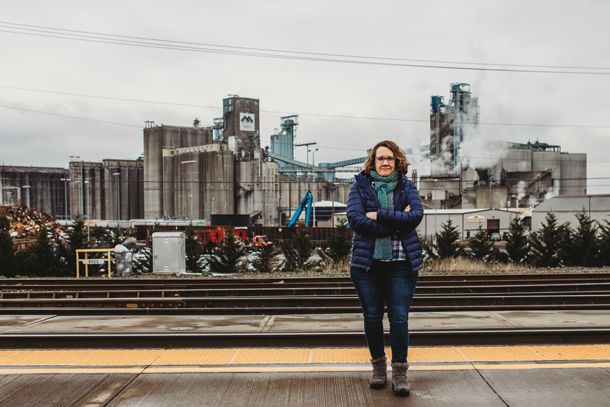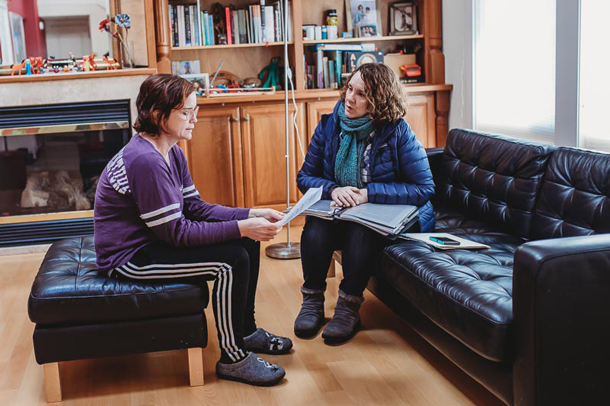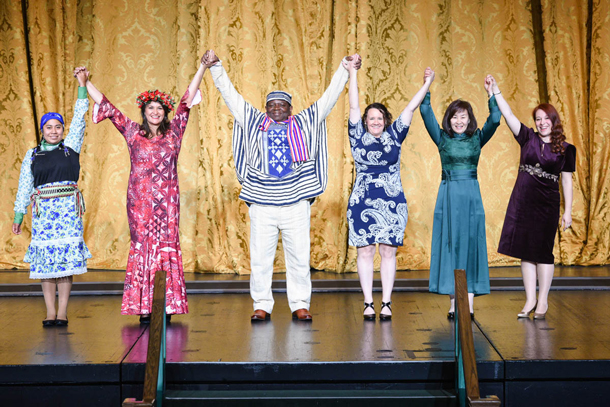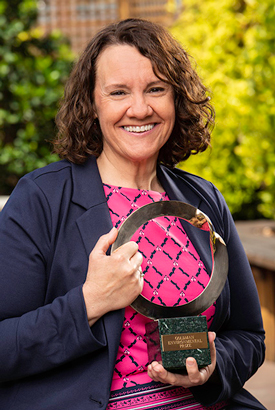Goldman Prizewinner Vanquishes Oil Terminal Project
Air Date: Week of May 10, 2019

Linda Garcia near the Port of Vancouver, in Washington state. (Photo: Goldman Environmental Prize)
When the Tesoro-Savage oil terminal project threatened to bring polluted air and the risk of devastating oil spills to her hometown of Vancouver, Washington, community organizer Linda Garcia got right to work – and along with her neighbors, vanquished the project. Garcia’s efforts to protect her community and stand up to fossil fuel interests have been recognized with one of the prestigious 2019 Goldman Environmental Prizes. She joins Host Steve Curwood to discuss how her community fought and won against Tesoro-Savage, and why even threats and harassment couldn’t silence her.
Transcript
CURWOOD: It’s Living on Earth, I’m Steve Curwood.
Each spring, we look forward to hearing the stories of courageous activists who win the Goldman Environmental Prize. Its recipients are from every corner of the world. Today we bring you the story of Linda Garcia, a community organizer and activist. When a major export terminal project threatened to bring 360,000 gallons of crude oil per day through the Fruit Valley neighborhood of Vancouver, Washington along the Columbia River, Linda Garcia led a long fight against the project. She and her fellow activists finally celebrated the cancellation of the Tesoro-Savage project in 2018, when Washington Governor Jay Inslee rejected its permit. Linda Garcia joins me now. Welcome to Living on Earth, and congratulations!
GARCIA: Thank you, Steve. I appreciate it.
CURWOOD: So how does it feel to have fought and won against this oil terminal project?
GARCIA: Amazing. [LAUGHS]
CURWOOD: [LAUGHS] Bet it does, yeah!
GARCIA: Yeah, I don't think any of us really anticipated the win. It's wonderful knowing that we did win one of the battles in the ultimate war.
CURWOOD: What do you mean, you didn't anticipate winning?
GARCIA: I think going into it, we recognized that a company that was, was trying to come into our community had a lot more power and a lot more resource, and a whole lot more money than what we did. But we ended up having people power. And we proved to them that that's the most important piece. It's not about the money. It's not about the profit, it's about people caring for each other.
CURWOOD: So what was the Tesoro-Savage Project trying to do with a new oil terminal facility in Vancouver, Washington; and why there, in particular?
GARCIA: Vancouver still has some room at their port, at the Port of Vancouver. And their goal was to bring in an oil by rail export terminal, and they were going to be bringing in unit cars filled with Bakken crude oil, both from the tar sands in Alberta, Canada, and the fields from South Dakota. And they were going to be bringing in multiple unit trains. One unit train is about 144 oil tank cars, train cars, and it's about a mile and a half long, and we were looking at between five and eight of those per day. And with each unit train comes more danger.

Linda Garcia meeting with a community member while door-to-door organizing against the Tesoro-Savage oil terminal project. (Photo: Goldman Environmental Prize)
CURWOOD: Yeah, let's talk about that. I mean, of course, there's always a catastrophic situation like a ginormous spill or derailment, but what would the day to day impacts of this project have been?
GARCIA: For me, specifically, and those in the Fruit Valley neighborhood immediate, the Port of Vancouver sits within the Fruit Valley neighborhood boundary. And for us, it was more about the air quality. The moment that that terminal would have gone online, every single second of every single day, there would have been VOCs, volatile organic compounds, emitted that pose great health risks and hazards, from asthma-causing chemicals to cancer-causing chemicals. And so for the majority of us in the beginning, it was about the air quality. And then as the battle kept going on, we started seeing more and more oil train derailments and explosions going along with that. The Lac-Mégantic in Canada, that was the largest one as far as oil by rail disasters. And then, just a few short months before the final decision was made, we had a derailment just about 40 miles east of us in Mosier, Oregon. That was tragic, and it brought the reality of that entire situation and the possibility of that happening so much closer to home. It was on the news 24-7, so it wasn't something that we could escape and pretend wasn't happening anymore. We couldn't say, "Oh, it's far away from home, that will that will never happen here." We saw that it could.
CURWOOD: Now, talk to me about the stakeholders there. Among other things, you're in Fruit Valley; that must mean that you grow a lot of stuff that folks all over the United States must eat.
GARCIA: Fruit Valley was once known as the prune capital of the world. Back in the day, that was the place that prunes were grown and exported. Now, there aren't prunes, but there are still several home farms. The Earth is very fertile there; growing is almost year-round for many fruits and vegetables. So to have that blend of industry at the Port of Vancouver, it was a work, and we always worked well together, Fruit Valley has always worked well together with the Port of Vancouver and had a great working relationship. So we could continue with the farming. Obviously, with more and more development coming, we've lost some of our farmland down there. But there are some farmers still going strong.
CURWOOD: And tell me who's, who's there in terms of people? Who lives in this, this area?
GARCIA: Fruit Valley is a, it's a very diverse community, from socioeconomic, to racial and cultural. It's kind of like a very small, close-knit big city. [LAUGHS] That probably makes no sense. But there are so many people with so many differences, but we're close; we take care of each other, we protect each other. I think that's how everything started. We recognized the need to be there for those that maybe couldn't stand up for themselves in the moment.

The six 2019 Goldman Environmental Prize recipients participated in a ceremony on Friday, April 26th. From left: Belén Curamil Canio of Chile (on behalf of her father, Goldman recipient Alberto Curamil); Jacqueline Evans of the Cook Islands; Alfred Brownell of Liberia; Linda Garcia of Vancouver, Washington; Bayarjargal Agvaantseren of Mongolia; and Ana Colovic Lesoska of North Macedonia. (Photo: Goldman Environmental Prize)
CURWOOD: Well, tell me, how did you build this coalition?
GARCIA: Um, it started mainly as other organizations coming in and helping, environmental organizations. Then we started getting some strong opposition to the terminal, which meant support for our group from unions; some local politicians stepped up to the fight. And so it was kind of a, an overall community organization coming together. As far as other communities locally, we have the tribal nations coming in; their livelihood depends on that river. And anything that could have gone wrong would have directly impacted and affected the river and the inhabitants that live from it and work from it. After the Mosier incident, we had the mayor of Mosier come down and begin testifying at the port. And before city council, and talking to the politicians in the local area there as well. We had communities upriver and downriver, from Idaho, Canada, Eastern Washington, Oregon, even California, coming in and sharing their stories of what their communities looked like, before, during, and -- if anything similar to the project that we were looking at being proposed -- what it looked like after as well. Anything that we heard from them, I guess we, we multiplied it by, you know, infinite number because this was proposed to be North America's largest oil by rail terminal.
CURWOOD: Now, why you? Why was it important for Linda Garcia to fight this oil terminal?
GARCIA: Um, I mean, there's so many answers to that one. Um, I think it's, it's just because it was the right thing to do. I, I didn't feel comfortable not doing anything. And there were so many voices of so many people who were afraid to speak up, or they didn't have the time to get out there and do it, and go to all of the meetings and testify; they were scared to do that. I was scared to do that, but I just kept pushing through because I -- it's more than idealism. It depends on people stepping up, and making sure that corporations and government entities don't try and pull the rug out from under us, they don't try and blindside us with decisions that they think are best for us. Instead of coming in and speaking at us, talking at us, they needed to listen, and they weren't doing that. And so for me, I needed them to hear us. It wasn't just, "I would like you to sit and listen." It was, "I need you to hear what we're yelling at you. We started with small voices, and we're large and we're loud, and you need to hear what we're saying." Because this is about our lives. It's about our livelihood, our sustainability, our connectedness, our vitality. It didn't feel right in my heart to stop. And so I just listened to my heart and just kept going.
CURWOOD: Linda, to what extent did you get hassled, threatened, confronted in inappropriate ways about your activism here?
GARCIA: I started receiving threats via phone in 2015. And it was every now and again, it wasn't constant. Recently, because I continue my work, it has escalated and has turned into things like my home being broken into multiple times; being assaulted, threatened; every possible thing you could think of; it's, it's not pleasant. It's terrifying. They need to know that that can't happen. And I'm not stopping.
CURWOOD: So fossil fuel companies are still trying to export their products abroad, especially as this country is getting off of coal and reducing the use of oil. How vigilant do you think your community and other port towns need to be about future proposals similar to the Tesoro-Savage one for the oil terminal?

Linda Garcia with her Goldman Environmental Prize Ouroboros sculpture. In addition to a monetary prize, Goldman Prize winners each receive this bronze sculpture. Common to many cultures around the world, the Ouroboros, which depicts a serpent biting its tail, is a symbol of nature’s power of renewal. (Photo: Goldman Environmental Prize)
GARCIA: Very vigilant. They need to keep in mind that the false promise of jobs everywhere is exactly that. It's kind of a fallback that they tend to use, they find the weak point and go for that. And obviously post-recession, the weak point is employment, and finding those jobs. In that vigilance needs to come the idea, the vision that there are clean jobs and green jobs. And that doesn't just mean environmentally, that means, you know, that can be over healthcare and IT and education and high tech. There are places and spaces for that. But most organizations and politicos don't look at that. They don't see the larger, greater picture. They see an old model, and while most of us can understand and see that those old models aren't necessarily working, it's, now it's a matter of trying to, to push them forward and see the progressive ideal that there are different arenas that we can look at. We don't have to fall back and rely on the old commodities, the dirty, dangerous commodities, that there are newer things out there. And the fight continues. We look now to get policy into place so that newer infrastructure for these commodities can't be built.
CURWOOD: Linda Garcia is an organizer with the Washington Environmental Council, and the recipient of this year's North American Goldman Environmental Prize. Again, congratulations, Linda.
GARCIA: Thank you so very much. I appreciate it.
Links
About Linda Garcia, 2019 Goldman Prize Recipient – North America
Living on Earth wants to hear from you!
Living on Earth
62 Calef Highway, Suite 212
Lee, NH 03861
Telephone: 617-287-4121
E-mail: comments@loe.org
Newsletter [Click here]
Donate to Living on Earth!
Living on Earth is an independent media program and relies entirely on contributions from listeners and institutions supporting public service. Please donate now to preserve an independent environmental voice.
NewsletterLiving on Earth offers a weekly delivery of the show's rundown to your mailbox. Sign up for our newsletter today!
 Sailors For The Sea: Be the change you want to sea.
Sailors For The Sea: Be the change you want to sea.
 The Grantham Foundation for the Protection of the Environment: Committed to protecting and improving the health of the global environment.
The Grantham Foundation for the Protection of the Environment: Committed to protecting and improving the health of the global environment.
 Contribute to Living on Earth and receive, as our gift to you, an archival print of one of Mark Seth Lender's extraordinary wildlife photographs. Follow the link to see Mark's current collection of photographs.
Contribute to Living on Earth and receive, as our gift to you, an archival print of one of Mark Seth Lender's extraordinary wildlife photographs. Follow the link to see Mark's current collection of photographs.
 Buy a signed copy of Mark Seth Lender's book Smeagull the Seagull & support Living on Earth
Buy a signed copy of Mark Seth Lender's book Smeagull the Seagull & support Living on Earth

